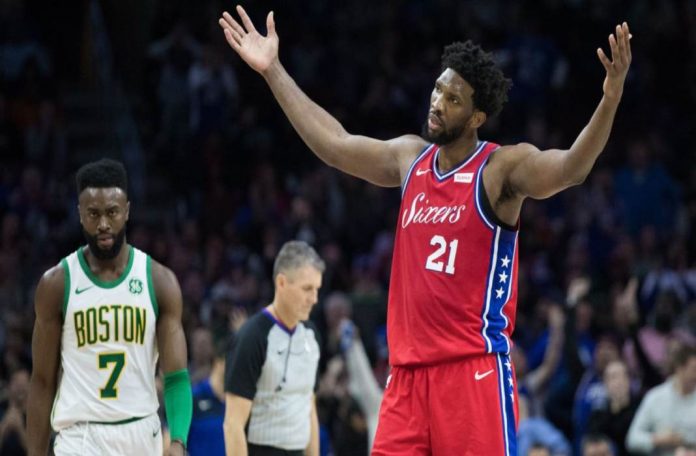The journey we went on as NBA fans that started in 2013 has come to a screeching, conventional halt. Sam Hinkie launched the Process that year and backed up his promises. They achieved 47 wins over three seasons and started a revolution of how NBA teams rebuild their rosters. But Hinkie was martyred in 2016. This was before seeing the two truest representations of his work realized: Joel Embiid and Ben Simmons. The heaping war chest of picks and optionality has been raided for short-term success, dimming a once bright future. To paraphrase Les Miserables, Hinkie dreamed a dream in times gone by, now life has killed the dream he dreamed.
Philadelphia had maintained the charade of his vision until it grew tiresome. Then, they ditched it to die in favor of quick success. It’s an intense irony that an analytically driven movement like the Process yielded two stars who shoot below 30% from three-point range and combined to shoot 2-8 from three in their latest loss to the Celtics.
Simmons is horrific, and Embiid has trended downward sharply since his rookie season. And while the Sixers have catapulted themselves to the top tier of the league when it comes to talent, it’s been in a traditional fashion, discarding the lessons of Hinkie like they were an adolescent phase. Hinkie said in his resignation letter, “shift the style of play towards tomorrow’s champions.” The Sixers have not followed that.
To quote Hinkie again, “A competitive league like the NBA necessitates a zig while our competitors comfortably zag.” Was the Tobias Harris trade a good move for the Sixers? Yes, but it was a zag. It was a return to the conventional method of basketball operations scorned by Hinkie and the acolytes of the Process.
Philadelphia has stopped trying to be tomorrow’s champions and started trying to be today’s. But today’s champions live behind the three-point line, and the Sixers feature Simmons, Embiid, and Jimmy Butler. They’re following the well-trod path of past teams – acquire assets and cash them in for established stars in search of a short-term championship opportunity.
It hurts to see a basketball movement, a cultural event, cast aside for a singular season attempt at a title run. While no one can ever truly replicate Hinkie’s thought process, I refuse to believe he’d be as short-sighted as to cash in the assets of Dario Saric, Robert Covington, Landry Shamet, and two first-round picks for two expiring stars. In the same year where the Golden State Warriors have accumulated arguably the most talent of any team ever, the Sixers are going all in.
While there may be assurances, there’s no guarantee of the return of Harris or Butler this offseason. Philadelphia may not even want Butler to return. This takes me back to the start of this article – the Process is dead. The Sixers tapped out and went the traditional route towards a title.
The Sixers wasted three seasons then abandoned the Process to join a race after everyone had a hefty head start. Butler was a deviation from the system, but the Harris trade makes it officially obsolete. As their recent game against Boston shows you, it’s not the best call. It’s easy to call Harris and maybe even Butler’s return a guarantee, but if they can’t even beat an Irving-less Boston team at home, what makes you think it’ll change come playoff time? Will Harris and Butler’s interest in returning remain after another conference finals-less season for the Sixers?
I leave you with one more quote from Hinkie, “A league with 30 intense competitors requires a culture of finding new, better ways to solve repeating problems. In the short term, investing in that sort of innovation often doesn’t look like much progress, if any.”
RIP The Process (2013-19). I fear you may have died in vain.

